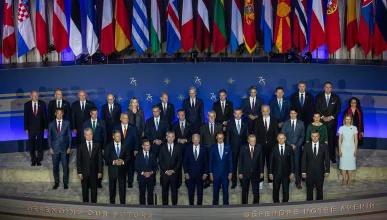North Atlantic Treaty Organizations (NATO) member countries gathered this week in Washington, D.C. to mark the alliance’s 75th anniversary. The Washington Summit convened all 32 allies to demonstrate the continued strength and unity of the Transatlantic Alliance.
For starters, the leaders gathering in Washington worked to overcome a big gap in their Ukraine strategy—between the principle that Ukraine is free to join the alliance with no veto by Russia and the reality that few are ready to let it in while it is at war with Russia. That proved impossible, so NATO sufficed with lots of smaller commitments of weapons, money and training, and many warm accolades for Ukraine.
But Ukrainian President Volodymyr Zelensky and leaders of other countries on the front line with Russia warned against the alliance watering down language, self-imposing red lines, and holding back concrete commitments to deter and push back Russian aggression in Ukraine and surrounding countries.
While allies have largely agreed on new pledges of military and financial support for Kyiv that have taken months to develop, countries on Russia’s border, in particular, are saying the alliance needs to do more.
They are critical of Congress’s six-month delay in delivering aid for Ukraine, want stronger language on commitments for Ukraine’s pathway to NATO, call for tripling financial commitments for Kyiv and want to confront head-on Russia’s sabotage on NATO territory.
President Joe Biden addressed NATO leaders and their spouses at the dinner he hosted at the White House Wednesday night, toasting the alliance and the shared ties between the alliance’s members.
“Jill and I are honored to have so many close allies and close friends all in the same room,” the president said, adding that “75 years ago, when our nations created NATO, former President Truman said and I quote, ‘What we’re about to do here is a neighborly act.’”
Biden awarded the nation’s highest civilian honor to NATO Secretary General Jens Stoltenberg on Tuesday evening, gifting the Norwegian diplomat with the Presidential Medal of Freedom in a surprise ceremony kicking off this week’s NATO summit.
“So much of the progress we made in the alliance is thanks to the secretary — he’s a man of integrity and intellectual rigor, calm temperament in a moment of crisis, a consummate diplomat who works with leaders across the political spectrum and always finds a way to keep his moving forward,” Biden said.
Russia winning the war in Ukraine would “embolden other authoritarian leaders” in Iran, North Korea, and China, Stoltenberg said in his remarks.
“They all support Russia’s war. They all want NATO to fail. So, the outcome of this war will shape global security for decades to come,” he said. “The time to stand for freedom and democracy is now; the place is Ukraine.”
At the Wednesday gathering, the leaders endorsed a new NATO Industrial Capacity Expansion pledge at the Washington Summit.
The Pledge aims to accelerate defence industrial capacity and production across the Alliance, and underscores the strategic importance of transatlantic defence cooperation.
According to NATO, at the meeting, Allied leaders reaffirmed that a robust defence industry is indispensable to keep NATO’s deterrence and defence strong, and to continue to support Ukraine. The Pledge includes long-term actions such as developing national plans to strengthen industrial capacity, accelerating multinational procurement, enhancing the implementation of standards to increase interoperability, removing barriers to trade and investment, and securing critical supply chains.
The Allies also pledged to deliver critical capabilities to Ukraine rapidly, with an initial focus on munitions and air and missile defence systems.
The new Pledge builds on the Defence Production Action Plan agreed at the Vilnius Summit in July 2023. Since then, Allies have made significant progress in updating national defence strategies, streamlining procurement processes and investing in industrial production. In January, European NATO Allies agreed to jointly buy up to 1,000 Patriot missiles. In the margins of the Summit, the NATO support and procurement agency (NSPA) has placed an order for Stinger anti-aircraft missiles worth $700 million.
Over the next five years, NATO Allies across Europe and Canada plan to acquire thousands of air defence and artillery systems, 850 modern aircraft, mostly 5th generation F-35s as well as a substantial number of high-end capabilities.
NATO members also agreed to set up a new cybersecurity unit aimed at warning military commanders of emerging hacking threats against the alliance.
The Integrated Cyber Defense Centre’s mandate will include sharing threat intelligence on cyber threats to private infrastructure that is “necessary to support military activities,” the alliance said in a statement. The center will be based at NATO’s military headquarters in Belgium.
The outcome of the November election matters enormously for NATO. The prospect of former President Donald Trump returning to the White House has alarmed many in Europe who fear he may reduce U.S. commitments to NATO or Ukraine — or pull them completely.
NATO leaders are expected once again to reaffirm their “open door” policy — that membership is open to any country meeting the requirements.
But Ukraine has yet to gain membership.
That goal will remain elusive as long as it is at war with Russia.
